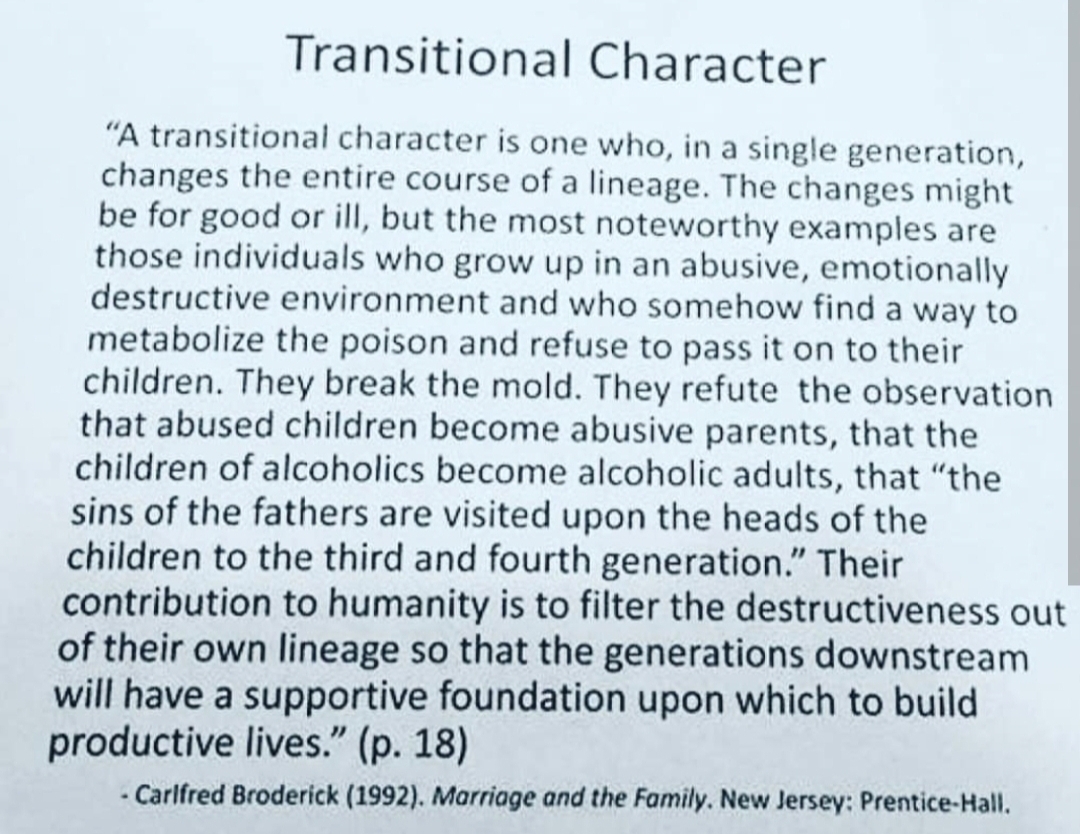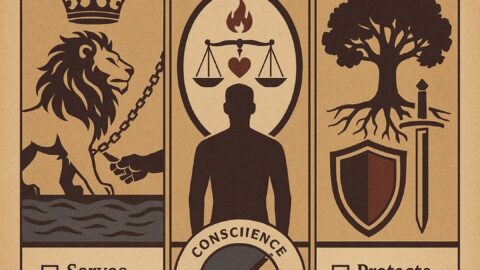Authors note: As people read through the article, we will recognize many faces of history that went against the unhealthy cultural practices, being considered crazy during their times, but as time progressed, they were proven right. We need our present generation to wake-up and become transitional characters.
Being a transitional character is a profound and courageous role. It doesn’t imply condemnation of previous generations but acknowledges that some inherited patterns, shaped by culture, society, or family norms, have led down harmful paths. By choosing to break generational curses, transitional characters redefine what is possible for future generations, often at great personal cost.

Breaking Generational Curses: A Path of Courage
Understanding the Past, but Not Condemning It:
Previous generations may have perpetuated unhealthy patterns, not out of malice but due to their own lack of awareness, resources, or societal norms.
Transitional characters honor their ancestors’ strengths while recognizing the need for change where harm has occurred.
Healing Trauma:
Breaking generational cycles involves facing deeply rooted pain and trauma, often buried or normalized within the family system. It requires self-awareness, therapy, and resilience to confront these issues and choose a new path.
Creating a New Legacy:
Transitional characters strive to replace cycles of dysfunction with healthier behaviors, communication, and relationships.This might mean setting boundaries, prioritizing emotional well-being, or rejecting destructive traditions.
Standing Alone for a Greater Purpose
Going Against the Grain:
Challenging entrenched family or societal norms often leads to resistance or alienation.Transitional characters may feel isolated as they redefine what family, love, and respect look like.
Prioritizing the Future:
The driving force is often the well-being of their children or future generations.They are willing to endure discomfort or estrangement to create a safer, more loving environment for their families.
Traits of Transitional Characters
Resilience: They endure the emotional weight of breaking away from unhealthy patterns.
Compassion: They seek healing not only for themselves but for those who came before them and those who come after.
Vision: They see beyond immediate challenges to the long-term benefits of their actions.
Strength: They refuse to perpetuate harmful cycles, even when it requires significant sacrifice.
The Impact of Breaking Generational Curses
For Children:
Children benefit from a nurturing, supportive environment free of the dysfunction that marked previous generations. They grow up with tools to thrive emotionally, mentally, and spiritually.
For Society:
Families that prioritize healing and growth contribute to stronger, healthier communities.Transitional characters are the seeds of cultural change, challenging and reshaping harmful societal norms.
Being a transitional character is an act of love and bravery. It’s about choosing a path of healing, growth, and transformation, even when it means standing alone. These individuals honor their families’ past while creating a brighter, healthier future for those who follow. They are proof that cycles of pain can end and that generational curses can be replaced with legacies of resilience, love, and strength.
Transitional characters play a pivotal role in recognizing and correcting the divergence between inherited practices and what is truly right, just, and aligned with eternal principles. Their task requires the courage to evaluate traditions, cultural norms, and societal systems critically, often exposing flaws that have been normalized. This process is not about rejecting the past entirely but learning from it, discerning what is harmful or out of alignment with truth, and charting a new course for the future.
Key Aspects of Being a Transitional Character
Recognition of Unhealthy Practices
- Transitional characters must develop the self-awareness to identify patterns of behavior or beliefs that perpetuate harm.
- This requires honesty and introspection, often acknowledging pain or trauma passed down through generations.
- Example: A family that normalizes emotional neglect or abuse must recognize these patterns before healing can begin.
Comparison to Higher Standards
- They measure inherited practices against divine laws, universal truths, or ethical principles to discern what is right.
- Transitional characters rely on scripture, moral teachings, or inner conviction as their compass.
- Example: Jesus Christ challenged the Pharisees by comparing their legalistic traditions to God’s true intentions of love, mercy, and justice.
Courage to Break Cycles
- Changing harmful norms often means going against family, culture, or societal expectations.
- Transitional characters may face isolation, ridicule, or opposition but persevere because of their commitment to righteousness.
- Example: Martin Luther King Jr. opposed segregation and systemic racism, even when it put his life in danger.
Redirection Toward the Right Path
- The ultimate goal is not destruction but restoration—rebuilding families, communities, and nations on a foundation of truth, faith, and integrity.
- Transitional characters work to establish a legacy of healing, justice, and hope for future generations.
- Example: Nehemiah rebuilt Jerusalem’s walls, restoring the city’s spiritual and communal integrity after years of neglect.
Practical Steps for Transitional Characters
Educate Yourself on the Past
- Study the beliefs and practices handed down to understand their origins, intentions, and consequences.
- Example: A transitional character in a family with financial instability might examine generational attitudes toward money, debt, and saving.
Seek Wisdom and Truth
- Compare cultural and familial norms to timeless principles found in scripture, philosophy, or ethics.
- Example: A transitional character combating a culture of dishonesty might study teachings on integrity, such as Proverbs’ emphasis on honesty.
Commit to Healing and Growth
- Breaking cycles often requires personal healing, such as processing trauma or unlearning destructive habits.
- Example: Through therapy, prayer, or self-reflection, transitional characters develop emotional regulation and healthier coping mechanisms
Model New Practices
- Set an example for others by living out the change you want to see. This may inspire others to follow your lead.
- Example: A parent breaking a cycle of anger models patience and open communication for their children.
Build a Support Network
- Seek like-minded individuals who share your commitment to truth, healing, and growth.
- Example: Transitional characters often find community in faith groups, advocacy organizations, or mentors.

Examples of Redirecting Culture, Family, and Nation
Family:
- Before: A culture of silence around mental health perpetuates shame and suffering.
- After: A transitional character normalizes seeking therapy and open discussions about emotions, breaking the stigma for future generations.
Society:
- Before: Discrimination against marginalized groups is deeply embedded in laws and social structures.
- After: Transitional leaders work to dismantle systemic injustice and create a more inclusive society.
Nation:
- Before: A nation prioritizes materialism and power over morality and service.
- After: Leaders call for repentance and a return to God-centered principles, fostering national renewal.
Scriptural and Historical Parallels
- Biblical Figures:
- Josiah: As king, he rediscovered the Book of the Law and led Israel back to God, tearing down idols and reestablishing covenant practices (2 Kings 22–23).
- Ruth: Left her Moabite heritage to embrace Israelite faith and loyalty to God, becoming a pivotal figure in the lineage of Christ.
The Cost and Reward of Change
Cost:
- Transitional characters often face loneliness, criticism, and even hostility as they challenge deeply ingrained norms.
- They may have to sacrifice relationships, comfort, or personal ambitions to fulfill their mission.
Reward:
- Their efforts create a ripple effect, setting a healthier path for families, societies, and nations.
- They leave a legacy of righteousness, hope, and resilience for future generations to build upon.
Transitional characters are transformative figures who step into the gap between harmful norms and a higher, often divine, calling. These individuals—whether biblical heroes, historical radicals, or societal reformers—have courageously opposed tyranny, corruption, and injustice to realign humanity with principles of righteousness, family unity, and community health. Often at great personal cost, they fight against prevailing cultural or societal norms that harm individuals, families, and nations, becoming agents of profound change.
Biblical Transitional Characters
Abraham (Genesis 12–25)
- Challenge: Abraham broke away from his pagan family traditions to follow God’s command, becoming the father of faith for Israel and many nations.
- Impact: His obedience established a covenant relationship with God, influencing countless generations.
- Sacrifice: Left his homeland, faced personal trials, and demonstrated unwavering trust in God’s promises.
Esther (Book of Esther)
- Challenge: Esther risked her life to intervene with King Xerxes to save the Jewish people from annihilation.
- Impact: Her courage preserved the Jewish nation, allowing God’s plan of redemption to continue.
- Sacrifice: Put her safety and position as queen on the line for her people.
Jesus Christ
- Challenge: Confronted the religious and political corruption of His time, embodying a higher law of love, forgiveness, and self-sacrifice.
- Impact: His life, teachings, and Atonement transformed human history, offering redemption to all.
- Sacrifice: Endured humiliation, betrayal, and crucifixion for the sake of humanity’s salvation.
John the Baptist (Luke 1, Matthew 3)
- Challenge: Spoke boldly against sin, including the immorality of King Herod (government policiesand laws).
- Impact: Prepared the way for Christ by calling people to repentance and a higher standard of living.
- Sacrifice: Was imprisoned and beheaded for challenging Herod’s government & unlawful marriage.
Paul the Apostle
- Challenge: Transitioned from persecuting Christians to being one of Christianity’s greatest missionaries, spreading the gospel to the Gentiles.
- Impact: He challenged the exclusivity of Jewish law and opened the gospel to all nations, shaping the early Christian Church.
- Sacrifice: Endured imprisonment, persecution, and martyrdom.
Historical Transitional Characters
William Wilberforce
- Challenge: Led the fight against the British slave trade, a deeply entrenched and profitable institution.
- Impact: His relentless advocacy led to the abolition of slavery in the British Empire, demonstrating the power of faith and persistence.
- Sacrifice: Faced ridicule, political opposition, and years of struggle in Parliament.
Martin Luther
- Challenge: Questioned the corruption in the Catholic Church, particularly the practice of selling indilgences.
- Impact: Initiated the Protestant Reformation, leading to greater access to scripture and a reemphasis on personal faith in God.
- Sacrifice: Faced excommunication and threats to his life.
George Washington
- Challenge: Defied British rule to lead the American colonies to independence while emphasizing moral leadership and unity.
- Impact: Helped establish a new nation founded on principles of liberty, justice, and accountability under God.
- Sacrifice: Risked his life and reputation for the cause of freedom
Dietrich Bonhoeffer
- Challenge: Opposed Adolf Hitler’s Nazi regime and spoke out against the German church’s complicity.
- Impact: His writings and resistance inspired Christians worldwide to stand against tyranny.
- Sacrifice: Was executed for his involvement in a plot to assassinate Hitler.
Radicals as Transitional Characters
Joan of Arc
- Challenge: Led French forces against English occupation during the Hundred Years’ War, driven by divine visions.
- Impact: Inspired French unity and resistance, ultimately becoming a symbol of faith and patriotism.
- Sacrifice: Was captured, tried for heresy, and burned at the stake.
Socrates
- Challenge: Questioned the moral and philosophical norms of ancient Athens, encouraging critical thinking and virtue.
- Impact: His teachings laid the foundation for Western philosophy.
- Sacrifice: Was sentenced to death for “corrupting the youth” and challenging Athenian authority.
Themes of Transitional Characters
Faith in God’s Higher Law
Transitional characters often prioritize divine commandments over human traditions, aligning themselves with eternal truths.
Example: Moses led the Israelites from idolatry to covenant faithfulness.
Family Restoration
These figures work to heal broken family systems or protect the next generation from harmful cycles.
Example: Joseph in Egypt preserved his family during famine, enabling God’s covenant people to thrive.
Community and National Health
They challenge corrupt practices and systems that harm society, advocating for justice, mercy, and righteousness.
Example: Nehemiah rebuilt Jerusalem’s walls, fostering a renewed sense of identity and faith among the Israelites.
Personal Sacrifice for Greater Good
Transitional characters endure rejection, hardship, and even death to bring about transformative change.
Example: Jesus Christ gave His life to redeem humanity, setting the ultimate example of sacrifice.
Lessons from Transitional Characters
Courage in the Face of Opposition
Change often requires standing against powerful forces, whether societal norms, tyrants, or ingrained traditions.
Biblical Parallel: Jeremiah preached repentance despite being ridiculed and persecuted.
The Power of Vision
Transitional characters see beyond their present circumstances to what could be, guided by faith, morality, or a divine calling.
Historical Parallel: Martin Luther’s Reformation reshaped the spiritual landscape of Europe.
Enduring Legacy
Their actions inspire future generations to continue the fight for truth, justice, and family.
Cultural Parallel:
George Washington’s leadership during the Revolutionary War laid the foundation for a more unified and free America.
Conclusion
Heroes, radicals, and figures from the Bible and history serve as transitional characters, standing against unhealthy norms, tyrants, and practices to realign families, communities, and nations with principles of righteousness, faith, and justice. These individuals embody courage, sacrifice, and resilience, leaving legacies that inspire others to confront injustice and uphold God’s eternal values. Their lives demonstrate that profound change often comes at a cost, but the rewards—a healthier, more faithful, and just world—are immeasurable.
Additional Reading:







One Response
This is one of your best articles yet.
This gives one a great hope for the future. But this future is one we must ourselves participate in as transitional characters ourselves.
Real food for thought.
Thanks.